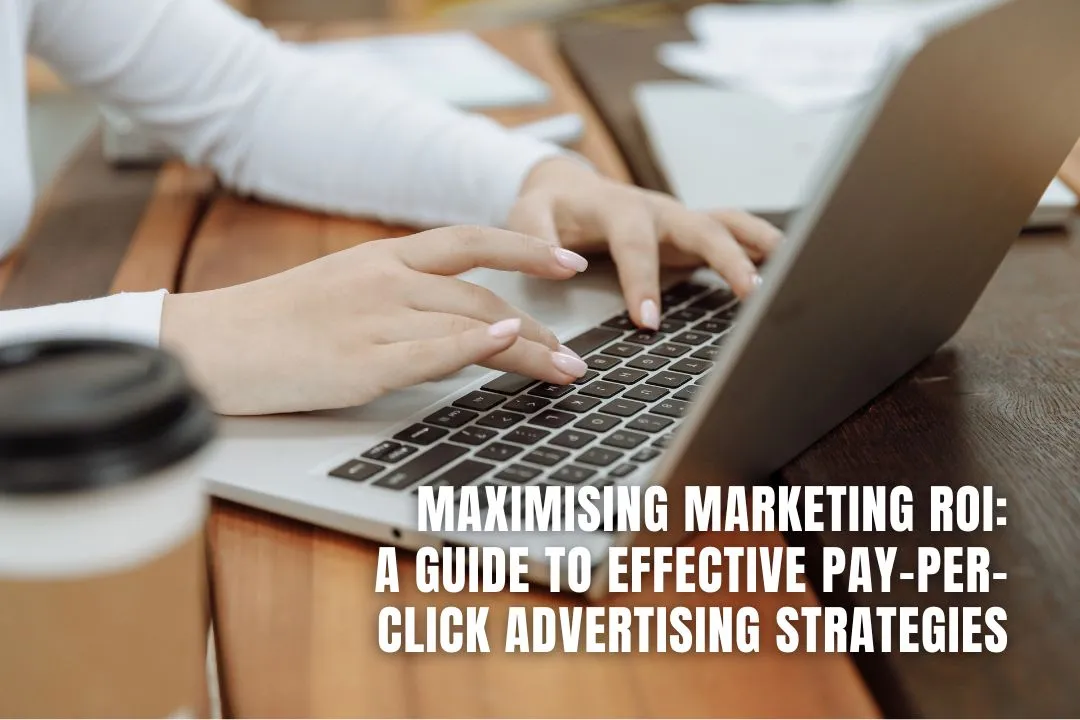November 20, 2024

Pay-Per-Click (PPC) advertising is a powerful tool in the digital marketing world. It allows businesses to connect with potential customers effectively by paying only when someone clicks on their ads. Understanding how to use pay-per-click advertising can lead to significant improvements in visibility and sales. This guide will explore key strategies to maximise your marketing return on investment (ROI) through effective PPC advertising techniques.
Pay-Per-Click (PPC) advertising is a method where businesses pay a fee each time someone clicks on their ad. This means you are buying visits to your site instead of trying to earn them organically. It’s a popular way to drive traffic quickly and effectively.
To understand PPC better, here are some important terms:
The PPC auction is how ads are placed on search engines. Advertisers bid for ad space, and the highest bid doesn’t always win. Factors like ad quality and relevance also play a big role in determining which ads appear first.
Understanding the PPC auction system is essential for creating effective campaigns. It helps you know how to budget and bid wisely to get the best results.
Before starting a PPC campaign, it’s essential to know what you want to achieve. Setting clear goals helps you focus your efforts. Here are some common goals:
For example, if your goal is to generate leads, you might create a landing page to collect contact information. Clear goals guide your strategy and ensure every decision aligns with your objectives.
Keywords are vital for any PPC campaign. Selecting the right ones can attract relevant traffic and reduce wasted spending. Consider these tips:
By focusing on the right keywords, you can connect with users who are genuinely interested in your offerings.
Managing your budget and bids is crucial for a successful PPC campaign. Here are some strategies to consider:
By carefully managing your budget and bids, you can maximise your return on investment (ROI) and ensure your campaign remains profitable.
Remember, a successful PPC campaign requires ongoing adjustments and monitoring. Stay flexible and be ready to adapt your strategies as needed to achieve the best results.
Your ad copy is your chance to grab a potential customer’s attention. A well-crafted ad can attract clicks and improve your click-through rate (CTR). Here are some tips to create effective ad copy:
Ad extensions can enhance your ads and provide more information to potential customers. Consider these types of extensions:
Quality Score is a crucial metric that affects your ad's performance. To improve it:
Continuous optimisation is key to achieving the best ROI with PPC. Regularly review your campaign data and make data-driven decisions to improve performance.
By following these strategies, you can enhance your ad performance and maximise your return on investment in PPC advertising.
Monitoring your PPC campaigns is essential for understanding their performance. Regular analysis helps you identify what works and what doesn’t. Here are some key points to consider:
Once you have gathered data, it’s time to make informed changes:
Continuous monitoring is crucial. It allows you to adapt quickly and ensure your campaigns remain effective.
Optimising your campaigns is an ongoing process. Here are some strategies:
By following these steps, you can ensure that your PPC campaigns are always performing at their best, maximising your return on investment.

To succeed in pay-per-click advertising, it’s essential to keep up with the latest trends. Being aware of industry changes can give you a competitive edge. Here are some key trends to watch:
Adopting new tools can significantly improve your PPC campaigns. Consider:
Understanding what your competitors are doing can provide valuable insights. Here’s how:
Staying informed about the latest PPC trends and tools is crucial for maintaining a successful advertising strategy. By leveraging these insights, you can adapt and thrive in a competitive landscape.
Integrating PPC with SEO can create a powerful marketing strategy. Here are some ways to do this:
PPC can enhance your social media marketing in several ways:
PPC can also provide valuable insights for your email marketing:
Integrating PPC with other marketing channels can significantly boost your overall marketing effectiveness. By leveraging insights from PPC, you can create a more cohesive and impactful marketing strategy.

To truly understand how well your PPC campaigns are doing, you need to look at several key metrics. Measuring your return on investment (ROI) is essential. Here are some important metrics to consider:
Engagement metrics help you see how users interact with your ads and website. Consider these points:
Regularly reviewing your PPC campaigns can help you spot areas that need work. Here are some steps to take:
Before diving into optimising your PPC landing pages, it's essential to evaluate what requires changes, why those changes are needed, and how to implement them.
By focusing on these aspects, you can ensure that your PPC efforts are not just generating clicks but also driving valuable actions that contribute to your business goals.
In conclusion, achieving success in PPC advertising requires a well-thought-out plan that covers all parts of your campaign. It's important to have clear goals, manage your budget wisely, and create engaging ads. Each element, from choosing the right keywords to monitoring your campaign's performance, is vital for getting the best results. Regularly checking and adjusting your campaigns is key to improving them over time. As you grow, keep an eye on new trends in the industry to ensure your strategies stay effective. With the insights and methods shared in this guide, you can confidently start your PPC journey, aiming to get the most out of your investment and help your business reach new heights in the digital world.
Pay-Per-Click (PPC) Advertising is a way of promoting your business online where you pay a fee every time someone clicks your ad. It's a method to buy visits to your website instead of trying to earn them organically.
To boost your PPC campaign's performance, focus on creating engaging ad copy, choosing the right keywords, and regularly reviewing your campaign data to make necessary changes.
ROI, or Return on Investment, in PPC advertising refers to the amount of profit you make from your advertising efforts compared to how much you spend on them.
Choosing the right keywords is crucial because they determine who sees your ads. Relevant keywords help attract the right audience to your website, increasing the chances of conversions.
Common PPC bidding strategies include manual bidding, where you set your own bids, and automated bidding, where the platform adjusts bids for you based on your goals.
You can measure the success of your PPC campaigns by tracking key metrics like click-through rates (CTR), conversion rates, and overall ROI to see how well your ads are performing.